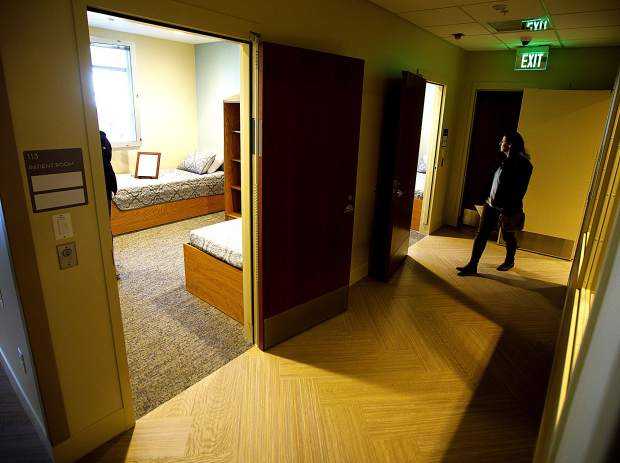New Walk-in Mental Health Crisis Center Set to Open in Frisco
There’s a new mental health resource in the county.
On Wednesday afternoon the new Summit Safe Haven Walk-in Crisis Center opened its doors for the first time to provide community members with a preview of the facility.
The center, located in the Frisco medical office building next to St. Anthony Summit Medical Center, will provide the area with a facility for individuals suffering from a mental health or addiction crisis to receive evaluation and treatment. The crisis center will also serve as a mental health acute treatment unit, along with a withdrawal management unit, for individuals necessitating additional care.

“What we know is that when people can stay close to home it’s a great thing for them and their ability to get better,” said Michelle Hoy, executive vice president of Mind Springs Health, which is operating the unit. “We know that it’s important to have a continuum of care. We’re hopeful it will help to decrease stigma, allow more people to ask for help, and help our local partners and the local community not have to travel as far for a psychiatric crisis.”
The unit has been in the works for about two years following the passage of Senate Bill 17-207, meant to expand and strengthen the state’s behavioral health crisis system in part by providing millions in enhancements. In addition to the $7.1 million provided to the Office of Behavioral Health to expand the crisis system around the state, the Western Slope was provided another $976,255, largely split to help fund (along with numerous partners) new crisis stabilization units in Summit and Montrose counties.
The extra money was well appreciated, and necessary for those in the field. Hoy said that the crisis system was particularly weak on the Western Slope. She said there are about 12 psychiatric beds per 100,000 people in the state, but currently just six per 100,000 out west.
“The bill was a game-changer in that it ended the criminalization of mental health issues, and this gives us a place to stabilize people,” said Sheriff Jaime FitzSimons, a strong advocate of improved mental health infrastructure in the county, who said the new unit would serve as a valuable resource to help keep individuals suffering from a crisis out of jail. “To me this is a huge boost to that group of people that seem to come in and out with minor charges. We’re trying to stop the revolving door of people coming into jail because they have a substance abuse disorder or mental health issue. This ATU now becomes somewhere people can go before they commit criminal charges.”
Once it opens, the facility will remain available 24/7 year-round, allowing anybody to walk in to receive an evaluation from the crisis management team with no charge to patients. From there, the team will decide on the best treatment path for each individual depending on factors such as risk and the patient’s history. Following evaluation some may be admitted to the acute treatment unit, where adults ages 18 and up can stay for up to five days.
The ATU consists of six beds in three rooms, along with a day room, kitchenette, nursing station, a small outdoor area and a “seclusion room” where guests can take some time to be alone. There is also a secured entrance in the back where law enforcement can drop off individuals in crisis, and all of the rooms are outfitted with anti-ligature fixtures to prevent patients from harming themselves.
The facility is staffed full-time by registered nurses, clinicians and nurse practitioners. Additionally, the program has partnered with West Springs Hospital in Grand Junction to providing telepsychiatry services.
There is no cost to patients at the ATU who are either uninsured or on Medicaid. Hoy said Mind Springs is currently working on contracting with private and commercial insurance companies to support the service.
“Crisis is a free service,” said Hoy. “The Office of Behavioral Health and others help us fund that. … Nobody should worry about coming into the center. We want people who are in crisis to get help.”
In addition to the ATU, Mind Springs is also set to reopen its withdrawal management unit, a facility attached to the ATU where individuals can detox in a safe environment and receive medical treatment if necessary. Like the ATU, the detox center is available at no cost to people who are uninsured or on Medicaid, and offers a sliding scale for insured individuals.
“Right now our vision is to get this up and running smoothly, and help the community and our partners understand what the facility can and cannot do,” said Hoy. “Help is available. People experiencing a crisis can and do get better.”
The crisis center doesn’t have a set opening day yet, though it’s likely to open sometime in May. The detox center is scheduled to open on April 19.
Along with the walk-in center in Frisco, Colorado’s larger crisis services are available 24/7 for anyone looking for help with mental health, substance abuse or emotional crisis. Individuals in need can call 1-844-493-TALK (8255), or text “TALK” to 38255 to speak confidentially with a trained professional. Visit ColoradoCrisisServices.org for more information.